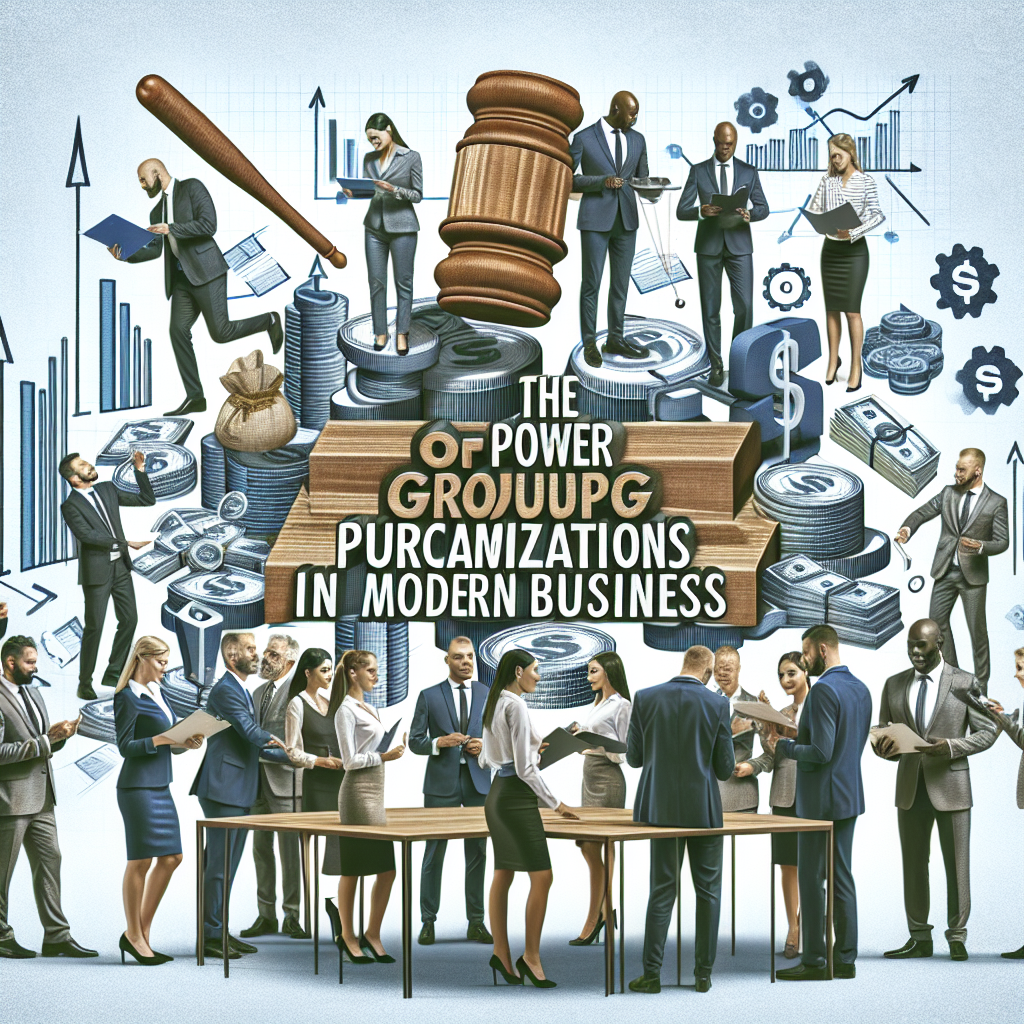Introduction
Corporate social responsibility (CSR) refers to the ethical framework that ensures companies operate in a socially responsible manner. This involves considering the impact of business decisions on society, the environment, and the economy. Suppliers play a critical role in this landscape, influencing how effectively a company can implement sustainable business practices.
In today’s business environment, integrating CSR into supply chain management is not just a choice but a necessity for long-term success. Companies that prioritize ethical sourcing and sustainable practices can differentiate themselves in the marketplace, attracting conscientious consumers and fostering loyalty.
However, implementing such changes often requires significant financial resources. This is where leveraging collective spend can be beneficial. By pooling resources with other organizations, companies can achieve drastic cost reductions which can then be redirected towards CSR initiatives.
Moreover, for non-profit organizations aiming to maximize their impact while adhering to CSR principles, understanding how to maximize federal grant funding can provide essential financial support.
It’s also important to remember that employee morale plays a crucial role in the successful implementation of CSR strategies. Simple measures like providing break room supplies can significantly enhance workplace satisfaction and productivity.
Lastly, in certain sectors such as healthcare, ensuring the safety of employees while they implement CSR strategies is paramount. This includes providing essential PPE for airborne precautions, which not only protects staff but also reflects a company’s commitment to social responsibility.
Understanding Corporate Social Responsibility (CSR)
Corporate Social Responsibility (CSR) refers to the ethical obligations businesses have to contribute positively to society while minimizing their negative impact. Key principles of CSR include:
- Accountability: Companies are responsible for their actions and the effects on stakeholders, including employees, customers, and communities.
- Transparency: Open communication about business practices fosters trust and accountability.
- Sustainability: Commitment to environmental stewardship ensures resources are available for future generations.
The historical context of CSR can be traced back decades, evolving from philanthropic efforts in the early 20th century to a more strategic approach in modern business practices. Initially, CSR was viewed as an ancillary activity focused on charitable donations. As global awareness increased regarding social issues, businesses began integrating CSR into their core strategies.
In recent years, the evolution of CSR has taken a sharper focus on supply chains. Companies now recognize that suppliers play a crucial role in achieving CSR goals. This shift emphasizes ethical sourcing and responsible production methods, making it essential for businesses to engage their suppliers in sustainable practices. The integration of CSR into supply chain management reflects a comprehensive approach that aligns profit with purpose.
To effectively manage this integration and ensure successful procurement processes, it is imperative for businesses to adopt a mindset of continuous learning and adaptation. As highlighted in Frank Corris’s transformative journey, mastering procurement through learning & adaptation can drive success in achieving CSR objectives.
Moreover, embracing constraints and optimizing processes can be beneficial when facing challenges such as succeeding with limited resources. This mindset not only aids in cost-saving but also aligns with the sustainability aspect of CSR.
It’s also important to understand the broader implications of CSR which includes aspects like Diversity, Equity, and Inclusion (DEI). These elements are crucial in fostering an inclusive workplace culture while fulfilling corporate social responsibilities.
Lastly, effective communication is key in procurement processes. Understanding certain procurement terms can significantly enhance how businesses convey the value of procurement in relation to CSR initiatives.
The Role of Suppliers in Driving CSR Strategies
Suppliers play a crucial role in achieving corporate social responsibility (CSR) goals. Their practices directly influence the sustainability and ethical standards of the entire supply chain. Consider the following points:
1. Importance of Suppliers
Suppliers are often the first link in the supply chain. Their alignment with CSR principles can significantly affect a company’s ability to fulfill its ethical commitments. When suppliers embrace sustainable practices, it reflects positively on the brands they support. This is where strategic sourcing comes into play, helping companies select suppliers that align with their CSR objectives.
2. Impact on Brand Reputation
The actions of suppliers can enhance or damage a company’s reputation. Ethical sourcing becomes a competitive advantage when companies partner with suppliers who prioritize sustainability. Brands that fail to monitor their suppliers risk facing backlash from consumers increasingly concerned about ethical practices. Therefore, understanding procurement optimization is essential for companies aiming to maintain their brand reputation while ensuring ethical sourcing.
3. Benefits of Ethical Sourcing
Engaging in ethical sourcing not only fosters positive supplier relationships but also can lead to cost savings and increased efficiency. Companies that invest in suppliers committed to sustainable practices often see improved product quality, reduced waste, and enhanced customer loyalty. Furthermore, such investments could potentially influence procurement engineer salary trends, reflecting the growing demand for professionals skilled in sustainable procurement.
Building strong connections with suppliers allows businesses to create a more responsible supply chain, fostering an environment where CSR strategies thrive. It’s also important to stay updated on top trends in supplier innovation as these can further enhance the effectiveness of CSR strategies.
Consumer Expectations and the Need for Transparency in Supply Chains
Consumer behavior has shifted dramatically in recent years, with a growing emphasis on sustainability and ethical practices. Key factors influencing this trend include:
- Demand for Safe Products: Consumers are increasingly prioritizing products that are safe for both their health and the environment.
- Influence of Younger Generations: Millennials and Gen Z are driving change in purchasing decisions. Their preference for brands that align with their values shapes market dynamics.
- Transparency in Manufacturing: Customers now expect clear insights into how products are made, from sourcing materials to labor practices. This demand for transparency reflects a broader commitment to corporate social responsibility (CSR) among suppliers.
The rise of digital platforms enables consumers to easily access information about a brand’s supply chain. Brands that fail to provide transparency risk losing customer trust and loyalty. Companies must recognize that integrating CSR into their operations is not just a regulatory requirement but a strategic advantage. Demonstrating ethical sourcing practices fosters stronger connections with consumers who value sustainability, directly influencing brand reputation and long-term success.
In this context, understanding the differences between purchasing groups and group purchasing organizations can be beneficial. These entities can play a significant role in streamlining supply chains while ensuring adherence to ethical standards. Additionally, it’s crucial to debunk common misconceptions about purchasing processes, such as those outlined in this mythbusting guide on GPOs, which can further enhance transparency and consumer trust.
Building Trust Through Effective Communication and Collaboration with Suppliers
Effective communication is crucial in building strong relationships with suppliers. It ensures that everyone understands what is expected, reducing the chances of misunderstandings. Here are some key strategies to improve communication with suppliers:
1. Regular Check-Ins
Schedule consistent meetings to discuss progress, challenges, and opportunities. This builds rapport and keeps everyone on the same page.
2. Open Feedback Loop
Encourage suppliers to provide feedback on processes. This two-way communication fosters trust and transparency.
3. Utilize Technology
Use technology platforms to get real-time updates on orders and deliveries. Efficient tech solutions enhance responsiveness.
Building trust in the supply chain requires dedication and intentional actions. Here are some tactics to consider:
1. Set Clear Expectations
Clearly define performance metrics and compliance standards from the beginning. This establishes a mutual understanding of goals.
2. Recognize Achievements
Acknowledge suppliers who meet or exceed expectations. Recognition can motivate improved performance.
Collaboration is vital in improving supplier relationships. Working together on projects or sustainability initiatives can bring significant benefits:
1. Joint Problem Solving
Collaborate on addressing challenges, leading to innovative solutions.
2. Shared Resources
Pooling resources can result in cost savings and improved efficiencies for both parties.
In times of crisis, it’s essential to have strategies in place that not only help in maintaining supplier relationships but also build resilience. Moreover, adopting effective sourcing strategies can significantly improve the overall procurement process.
Trust-building through effective communication and collaboration not only strengthens supplier relationships but also supports broader CSR objectives, leading to sustainable business success.
Long-term Economic and Environmental Benefits of Supporting Suppliers’ CSR Initiatives
Supporting suppliers in their Corporate Social Responsibility (CSR) initiatives presents significant advantages for businesses and communities alike. Here are key benefits:
1. Economic Sustainability
Investing in suppliers who prioritize CSR can lead to reduced costs over time. Ethical sourcing practices often result in improved operational efficiencies, which can translate into lower prices for consumers. Companies that engage with socially responsible suppliers frequently experience enhanced brand loyalty and customer satisfaction. Moreover, leveraging resources such as a GPO membership can further amplify these economic benefits by streamlining procurement processes and reducing costs.
2. Community Impact
By focusing on responsible sourcing, businesses can uplift the communities where their suppliers operate. This fosters local economies, strengthens workforce development, and creates job opportunities. When companies collaborate with suppliers committed to social responsibility, they contribute positively to the socio-economic landscape.
3. Climate Change Mitigation
Responsible sourcing plays a crucial role in addressing climate change. Suppliers that adopt sustainable practices reduce their carbon footprint, leading to cleaner production methods and environmentally friendly products. Companies supporting these initiatives not only enhance their own sustainability credentials but also participate actively in global efforts to combat climate change.
Prioritizing these economic and environmental benefits reinforces the importance of supplier engagement in CSR initiatives, creating a win-win scenario for all stakeholders involved. Additionally, exploring private sector group purchasing benefits could provide further avenues for supporting suppliers while maximizing economic advantages.
Challenges Companies Face in Implementing CSR Standards with Suppliers
Implementing corporate social responsibility (CSR) standards with suppliers involves several challenges that can hinder effective integration. Key issues include:
1. Infrastructure Gaps
Many suppliers lack the necessary infrastructure to comply with CSR standards. This can result in uneven adherence across the supply chain, creating risks for companies that prioritize ethical sourcing.
2. Compliance Challenges
Ensuring that suppliers meet CSR requirements often proves difficult. Companies may face obstacles related to differing regulatory frameworks, varying interpretations of standards, or lack of resources among smaller suppliers. Embracing a compliance-driven sourcing strategy can help mitigate some of these challenges by enhancing reputation, reducing risks, and aligning with ethical standards.
3. Visibility Issues
Limited visibility into supplier practices can complicate monitoring efforts. Without clear access to data and processes, companies struggle to assess compliance and ethical behavior effectively.
To overcome these hurdles, collaboration emerges as a vital strategy. Rather than focusing solely on compliance, fostering open communication and partnership can motivate suppliers to embrace CSR initiatives. By providing support, resources, and training, companies can build stronger relationships with their suppliers. This collaborative approach not only enhances compliance but also encourages a shared commitment to sustainability and ethical practices throughout the supply chain.
Additionally, it is essential to focus on maximizing supplier performance, ensuring quality and reliability while maintaining CSR standards.
Case Study: Hubzone Depot LLC – A Women-Owned Business Leading the Way in Supplier CSR Implementation
Hubzone Depot LLC exemplifies the integration of corporate social responsibility (CSR) within its business model. As a HUBZone certified business and women-owned enterprise, the company is committed to supporting local communities while providing high-quality supplies and services primarily to public sector clients.
Mission and Services
- Mission: To be a Tier 1 HUBZone Certified Woman-Owned Office and Industrial Supplier.
- Services: Offers streamlined purchasing solutions, bulk buying power, and exclusive discounts aimed at optimizing expenses for organizations. This includes specialized strategies such as tail spend management, which can significantly improve procurement efficiency.
CSR Implementation
Hubzone Depot actively incorporates CSR principles through:
- Community Commitment: Employing individuals residing in HUBZone areas fosters local economic growth.
- Transparency: The company maintains best-in-class service integrity with transparent reporting practices, ensuring accountability in its operations.
- Collaborative Approach: Works with vendors via Group Purchasing Organizations (GPO), enhancing ethical sourcing and supplier relationships. These partnerships also allow Hubzone Depot to share valuable insights, such as tips for managing a one-person procurement function, which can help streamline operations for smaller organizations.
Through these initiatives, Hubzone Depot LLC not only demonstrates a commitment to ethical practices but also serves as a model for other businesses navigating the complexities of CSR in their supply chains.
Best Practices for Companies to Effectively Engage Suppliers in CSR Initiatives
Engaging suppliers effectively in CSR initiatives requires a strategic approach. Here are some best practices for supplier engagement strategies:
1. Establish Clear Expectations
Communicate your CSR goals and standards to suppliers upfront. This clarity fosters alignment and encourages shared responsibility towards ethical practices.
2. Provide Training and Resources
Equip suppliers with the necessary tools and knowledge to meet CSR standards. Offering workshops or access to online resources can facilitate understanding and compliance.
3. Monitor Performance Regularly
Implement a system for ongoing evaluation of supplier practices. Utilize performance metrics to ensure adherence to CSR commitments while identifying areas for improvement.
4. Incentivize Ethical Behavior
Develop incentive programs that reward suppliers for demonstrating exceptional commitment to CSR. This could include financial bonuses, long-term contracts, or public recognition.
5. Collaborate on Solutions
Foster an environment of collaboration by involving suppliers in problem-solving discussions. Working together can lead to innovative, cost-effective solutions that benefit both parties.
Maintaining ethical standards does not have to compromise expense optimization. Consider the following tips:
- Leverage Group Purchasing Organizations (GPOs): Joining GPOs can provide access to bulk pricing without sacrificing quality or integrity.
- Implement Cost-Saving Technologies: Invest in technologies that streamline operations, reduce waste, and increase efficiency, ultimately lowering costs while promoting sustainability. For instance, exploring best procurement software can significantly enhance your procurement strategy.
By integrating these practices into your supplier engagement strategies, companies can cultivate stronger partnerships while advancing their CSR objectives.
Conclusion: The Future of Corporate Social Responsibility in Supply Chain Management
The world of corporate social responsibility (CSR) is changing quickly. To stay competitive and relevant, companies must embrace future trends in CSR among suppliers.
Key actions for companies include:
- Prioritizing ethical practices in supply chains
- Engaging with suppliers to ensure compliance with CSR standards
- Investing in transparency to meet consumer demands
- Collaborating on sustainability initiatives that benefit communities
By focusing on these strategies, businesses not only enhance their brand reputation but also contribute positively to society. The importance of CSR suppliers will continue to grow as consumers increasingly prefer brands that align with their values.
For those looking to make an impact in this evolving landscape, exploring entry-level procurement jobs could be a great starting point. These roles often provide the opportunity to influence supply chain practices directly, making them a vital part of the CSR movement.
Taking proactive steps now positions companies to thrive in a future where ethical responsibility is paramount. Embrace this change and lead the charge toward a sustainable and responsible supply chain.





